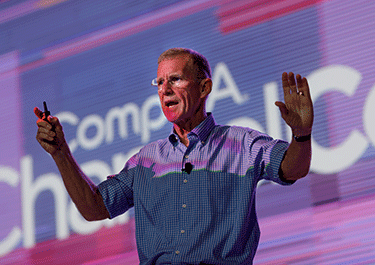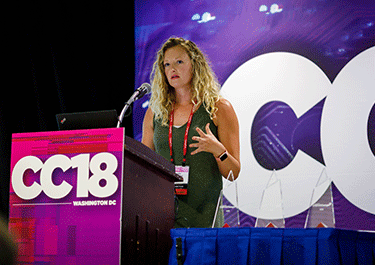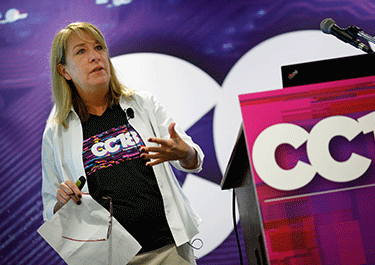 When General Stan McChrystal arrived in Iraq in 2003, the situation was dire. “The killing was on this accelerated path,” he said during his keynote address at CompTIA ChannelCon 2018 last week at Marriott Wardham Park in Washington, D.C.
When General Stan McChrystal arrived in Iraq in 2003, the situation was dire. “The killing was on this accelerated path,” he said during his keynote address at CompTIA ChannelCon 2018 last week at Marriott Wardham Park in Washington, D.C.
At the time, McChrystal was commander of the U.S. Army’s Joint Special Operations Command (JSOC), which was charged with dismantling the terrorist organization Al-Qaeda in Iraq. He led hardened Army vets to do so. “Fifty percent of Delta Force [a unit within JSOC] had been wounded and was back in the game,” he said. As McChrystal described them, these were men and women 35-to-50-plus years of age, who closely resembled the Army characters seen in movies like Black Hawk Down and Zero Dark Thirty.
The way McChrystal painted his situation in Iraq was just as cinematic. He was told not to worry about everything else happening in Iraq and just focus on finding and destroying this terrorist organization that was “metastasizing like a cancer,” he said. “But we couldn’t find it because it wasn’t there.”
The problem was that Al-Qaeda in Iraq was innovative; using modern tools like smart phones to essentially hide in plain sight. Meanwhile, “I’ve got the best antiterrorism force in the world, but it’s a legacy system,” McChrystal said.
The Mother of All Meetings
When American forces captured Iraqi president Saddam Hussein in December 2003, President George W. Bush called McChrystal and told him, “You’ve got a great organization.”
“I took him at his word,” he said. “But we were not moving the needle on a big problem in Iraq.” Despite taking out so much of Al-Qaeda in Iraq’s leadership, it persisted. McChrystal asked himself what would happen if a force invaded the Pentagon and killed 13 leaders. “I thought, ‘We’d get better,’” he joked. “Of course, I didn’t say that out loud.”
McChrystal adapted, stepping up raids, but the enemy changed up as well. Meanwhile, with forces in 27 different countries and 76 different bases, communication was a challenge. McChrystal described it as so repetitive and out-of-touch that it was like “a self-licking ice cream cone.”
So, he set out to create what he called “a shared consciousness” within JSOC. It started a daily 90-minute meeting that connected 7,500 people. He joked that the business professionals in the audience were likely horrified by the prospect of “the mother of all meetings” but “it was the most efficient thing I’ve ever been a part of in my life.”
Don’t Just Follow Orders
JSOC destroyed Al-Qaeda in Iraq by summer 2008. “We didn’t run them into the ground because we were bigger and stronger,” he said. “We ran them into the ground because we developed a system they couldn’t compete with.”
Key to this system was building a culture that avoids rigidity, the big takeaway for the audience at ChannelCon. “What do you do if someone screws up?” McChrystal asked. “In the military, you create a policy, and this leads to more policies, which become excuses for not doing things.”
So McChrystal threw out the policies, telling his people to simply use their best judgment. He went from a mindset that simply tells soldiers, “Execute the order,” to one that tells them, “If the order is wrong, execute the order we should have given you.”
To illustrate how all this translates to the corporate world, McChrystal cited an incident last year in which a passenger on a United Airlines flight at O’Hare International Airport in Chicago was dragged off a departing plane against his will and this was caught on video and went viral. During the ensuing public outcry, United CEO Oscar Munoz issued a series of statements. McChrystal zeroed in on five words from these statements, “Our employees followed established procedures.”
Like a lot of people did at the time, he found this tone-deaf. But after looking into it, McChrystal realized Munoz was right, and that was the problem. “Checklist, rules-based management doesn’t work,” he said, something Munoz himself admitted earlier this summer, appropriately enough also on a business conference stage.
At the conclusion of his remarks, McChrystal sat down for a Q&A with CompTIA CEO Todd Thibodeaux, who’d delivered a keynote just before the general. Thibodeaux asked him what business can learn from the military. “You’d be shocked by how similar they are,” he said. “Neither are really command-and-control. At the end of the day it’s about what people want and decide to do. What drives people is the connections between them.”
Click here to get full coverage of ChannelCon 2018!
 Add CompTIA to your favorite RSS reader
Add CompTIA to your favorite RSS reader

